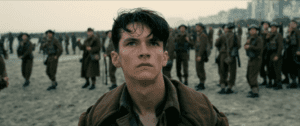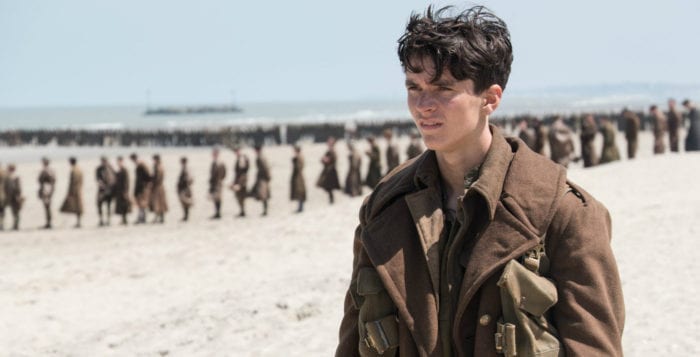Movie Review: ‘Dunkirk’ shows a different kind of war
By Kyle Barr
How many war movies say that mere survival is not enough? In these films heroics are often displayed by those who sacrifice their lives for their fellow soldiers or defeat the enemy against overwhelming odds.
In “Dunkirk,” directed by Christopher Nolan, our empathy doesn’t end at the people who risk life and limb to save others, but the movie also places us firmly in the shoes of soldiers who want to do nothing more than survive. And while the film has a few small problems with pacing, Nolan tries to say something about battles like Dunkirk, that sometimes survival is victory, and survival is in turn heroic.

Every director with enough clout has to have their war movie. The best directors have found the war or battle that fits their directing style. Spielberg went for the overarching heroics of World War II soldiers during and directly after the invasion of Normandy. Kubrick went for the general insanity and dehumanizing nature of the Vietnam War.
So what does Christopher Nolan, who has directed and written such intricately designed plots for movies like “Inception” and “Memento,” do? He again goes for the complicated, so much so that he put his sights on the evacuation of Dunkirk after the German blitzkrieg of France where French, British and other Allied soldiers were pushed back to the beaches of the city and surrounded on all sides. German U-boats prowled the English Channel and German bombers and fighters constantly pounded the men on the beach who were desperately trying to find a way to return to English shores.
There is the subtle hint of a ticking clock in nearly every scene that grows ever more menacing as the tension ramps up. We don’t even see a German soldier until the very end the film. Instead, time is the enemy.
Nolan uses time to structure the film in a very different way. The film is broken up not just into three different points of view, — of young soldier Tommy (Fionn Whitehead); boat captain Mr. Dawson and his son Peter (Mark Rylance and Tom Glynn-Carney); and an RAF fighter pilot Farrier (Tom Hardy) — but also into three separate time frames — that of a week, a day and an hour, respectively.
This does cause some confusion as the point of view jumps from one character to the next. If you are invested in one character’s story, it can be hard to readjust to what another character is doing and remember that some things that have happened in one man’s story have yet to happen in another.
But what is so masterful about this film is how well the tension ramps in tandem with each individual story. Events get more suspenseful for each character as Tommy grows more desperate to get off the beach, Mr. Dawson braves more dangerous waters filled with German U-boats and surrounded by German planes, and Farrier spends more and more fuel in order to stay in the air longer and protect the men below him.
In a movie as technical as this, most audience members will even lose the names of the characters among the minutia; so it is so important the actors carry the rest of the emotional weight. Thankfully the entire cast is up to the task. Hardy has to express himself constantly stuck in a airplane cockpit and wearing a mask, but you can tell how pained he is as he counts down his fuel reserves. Whitehead is a relatively unknown actor but his desperation is keenly felt throughout the entire film.
Most of the attention, however, has to go to Rylance, who holds a good part of the film’s emotional weight on his shoulders. His gentle, yet determined demeanor represents all those on the civilian boats who helped ferry the thousands of soldiers off the beach, and he does it so effortlessly it’s hard not to feel empathy for his struggle.
But why do the film with three separate point of views and three separate time frames? It all seems a little egotistical on Nolan’s part until it becomes clear at the very end, where a soldier reads Winston Churchill’s famous speech of June 4, 1940. At Dunkirk, survival was heroism because it meant those soldiers could live to fight another day and that England would not surrender its forces so eagerly.
As Winston Churchill said before the House of Commons: “[W]hatever the cost may be, we shall fight on the beaches, we shall fight on the landing grounds, we shall fight in the fields and in the streets, we shall fight in the hills, we shall never surrender.”
Rated PG-13 for intense war experience and some language, “Dunkirk” is now playing in local theaters.







